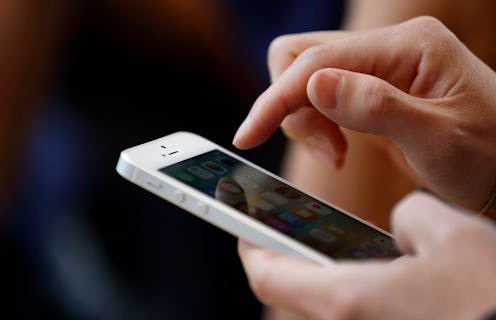Life
Do Fertility Apps Actually Work?
Fertility apps are becoming more and more common, promising to tell you when it's possible for you to get pregnant, which you can then use to either achieve or avoid a pregnancy. But do trust fertility apps actually work? According to recent research, it turns out that it depends on the app — and many are far from reliable.
In a new study published in the Journal of the American Board of Family Medicine, researchers led by Marguerite Duane, adjunct associate professor at Georgetown University School of Medicine and executive director of Fertility Appreciation Collaborative to Teach the Science (FACTS), looked at 95 apps offered through various online app stores to help women track fertility. Of those 95 apps, 55 contained a disclaimer stating that they shouldn't be used to avoid pregnancy or did not claim to use evidence-based fertility tracking. In my opinion, that's alreadu a little suspect; you shouldn't need to check the fine print to see if a fertility tracker app really believes in its own ability to track fertility.
Of the remaining 40 apps, researchers rated each one on a five-point scale based on 10 criteria — and they found that only six had a perfect score. Over half of the apps (21 out of 40) didn't score above a three. Not exactly what you're looking for when you're talking about controlling whether or not you get pregnant.
It's worth noting that this study was mainly focused on whether or not apps gave people a false negative, meaning it told them they weren't fertile on days when they actually were. They didn't look as closely at whether apps gave false positives, telling people they were fertile on days they weren't — which means that the study's results are more useful in assessing the efficacy of apps for people who want to avoid getting pregnant, rather than the ones who might be using an app to try getting pregnant. If your goal is pregnancy, it's possible that the apps rated might do better. The researchers plan to do a follow up study to address these and other questions.
Of course, in the meantime, it might be best just to not rely too much on your fertility app.
"Smartphone apps are increasing in popularity because more and more women are interested in using natural or fertility awareness based methods of family planning because they want to feel empowered with greater knowledge of their bodies," said Duane in a press release. But, she continued, the new research shows that people should first learn about how to measure fertility markers from a health professional before using an app, and should thoroughly review any app before choosing one.
A full list of apps that the researchers examined that do not claim to use an evidence based approach or to be able to prevent pregnancy can be found at the FACTS website here. Knowledge is power, after all.
Image: Giphy
